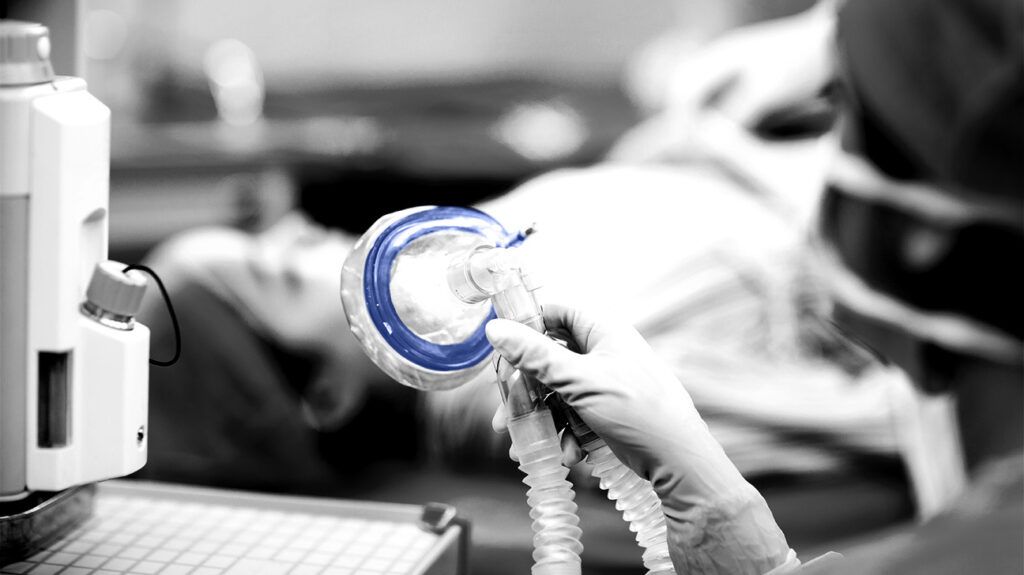- A new study concludes that weight loss drugs can create health issues for people going under anesthesia.
- They say GLP-1 RA medications such as Ozempic can cause a build-up of gastric contents in the abdomen, raising the risk of aspiration during surgery.
- Researchers say people taking these weight loss drugs may have to fast longer before surgery.
Weight loss drugs such as Ozempic and Wegovy can be problematic when a person undergoes anesthesia, according to a
In their study, researchers noted that medications known as glucagon-like peptide-1 receptor agonists (GLP-1 RAs), which have been approved for use with type 2 diabetes and weight management, can create potentially serious health issues while mixing with drugs used in anesthesia during surgery and other medical procedures.
“Our findings were quite surprising. More than half of the patients on a GLP-1 RA had significant gastric contents on gastric ultrasound before an elective procedure, despite adhering to preoperative fasting,” said Dr. Sudipta Sen, the first author of the study and a professor in the Department of Anesthesiology, Critical Care and Pain Medicine at the McGovern Medical School at UTHealth Houston, in a statement.
“This incidence was significantly higher compared to patients not on a GLP-1 RA, showing a strong link between GLP-1 RA drugs and potential aspiration risk under anesthesia,” she added.
The study was prompted by internal quality reviews done at UTHealth Houston after staff members reported cases of aspiration under anesthesia with people taking weight loss drugs despite “adequate fasting” before procedures.
Aspiration is when stomach contents enter the lungs. It’s considered potentially dangerous.
The research team consisted of subspecialized anesthesiologists with expertise in point-of-care ultrasound, allowing bedside assessment of stomach contents.
A mechanism of GLP-1 RA medications that contributes to glycemic control and weight loss is slowing the stomach emptying gastric contents. The increase in residual gastric volumes is called a “full stomach” on gastric ultrasound.
The study looked at more than 120 people scheduled for elective procedures in June and July 2023.
Researchers calculated that 56% of people using GLP-1 RAs showed increased residual gastric content, compared to 19% of those not taking the medication. The researcher team said there was a 30% prevalence of increased residual gastric content with the use of weight loss drugs.
With the increased use of GLP-1 RA medications, Sen said fasting times for these patients before going under anethesia may need to be reexamined.
“Patients must ensure they disclose their use of this medication to their surgeons and anesthesiologists,” Sen said. “This information is crucial for us to provide appropriate recommendations, such as adjusting drug administration before elective procedures, recommending extended fasting, or rescheduling an elective procedure if necessary.”
Last June, the American Society of Anesthesiologists released new guidance for screening GLP-1 RA use before surgery and informing patients of the risk of possible adverse outcomes. Recommendations included having doctors ask those having surgery to pause GLP-1 RAs prior to their procedure.
“Our study fills a significant gap in the current understanding and management of patients on GLP-1 RAs undergoing surgery,” Dr. Omonele Nwokolo, a study senior author and a professor in the Department of Anesthesiology, Critical Care and Pain Medicine at McGovern Medical School at UTHealth Houston, said in the statement.
“The lack of data had previously led societies to rely on expert opinion for guidance. Our evidence paves the way for informed guidelines and further research to mitigate anesthesia-related risks in this patient population,” she added.
Sen told Medical News Today that she wouldn’t characterize these type of weight loss drugs as dangerous.
“GLP1 receptor agonists – GLP1 RAs – are essential medications with clear benefits for diabetes treatment, weight management, and other off label uses,” she said. “The primary concern in patients undergoing surgery who have appropriately fasted is the slowing of gastric motility, which causes retained food or liquid in the stomach. Our research identified a higher occurrence of residual stomach contents in appropriately fasted patients taking these drugs when compared to those not on a GLP1 RA.”
Sen added that the process of making those getting surgery fast long enough beforehand is becoming more important.
“The utilization of GLP1RA is on the rise,” she noted. “Individuals undergoing elective surgery or procedure must disclose the use of this medication to their healthcare providers so that appropriate recommendations can be made prior to surgery if feasible.”
Dr. Mir Ali, a bariatric surgeon and the medical director of MemorialCare Surgical Weight Loss Center at the Orange Coast Medical Center in California who was not involved in the study, told Medical News Today that, overall, the drugs that prompted the research are safe.
“They have been around for many years for control of diabetes, but over the last few years became FDA approved for weight loss,” Ali said. “One of the effects of these drugs that help with weight loss is to slow gastric emptying. However, for anesthesia, it is safest to have the stomach empty prior to induction of anesthesia. We advise patients taking these drugs to stop them at least one week prior to any procedure.”
Ali added that as more people take these drugs, it’s possible the issue with anesthesia may become more frequent.
“Proper education of the risks and side effects of these medications is very important,” he said. “For elective surgery, if the patient has not stopped the medication, then the surgery could be postponed. For emergency surgery, it is typical to treat the patient as if they have a full stomach and extra precautions are required.”
Credit: Source link




